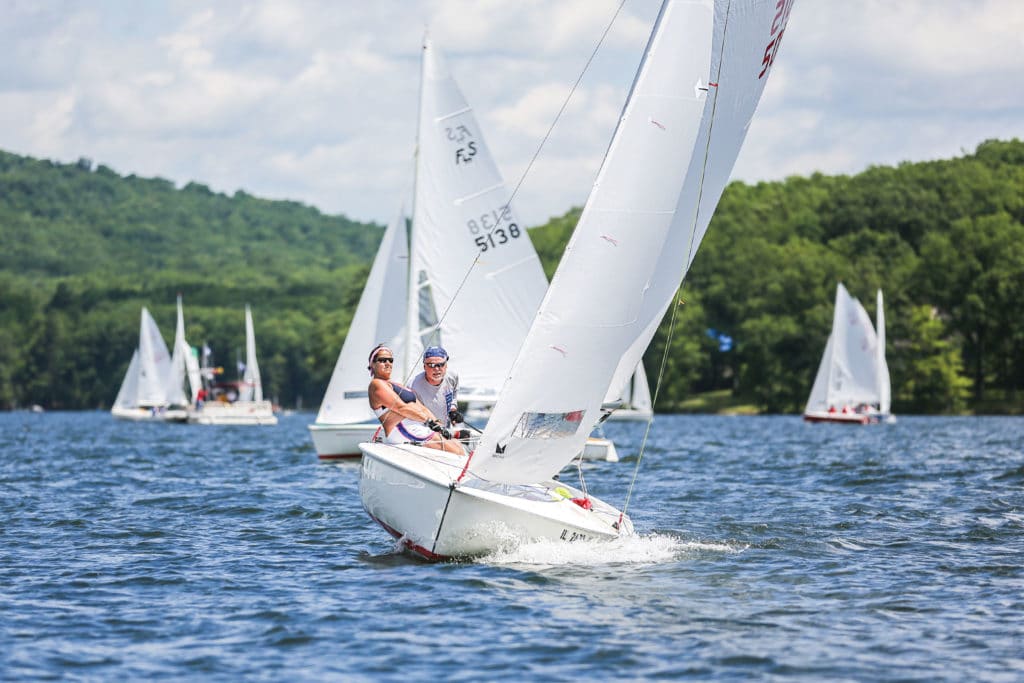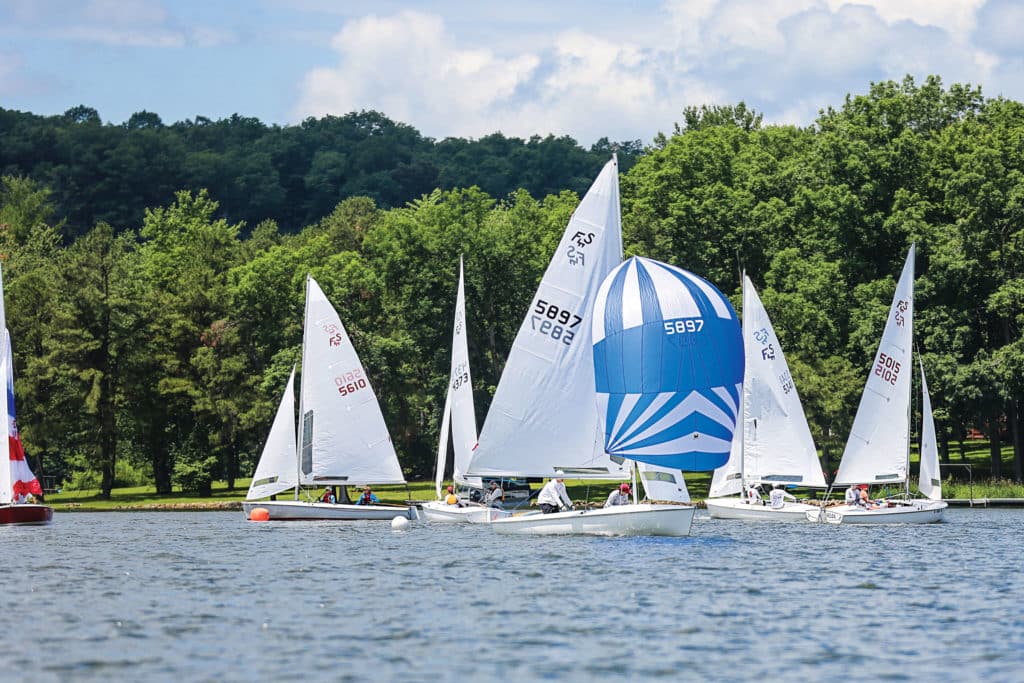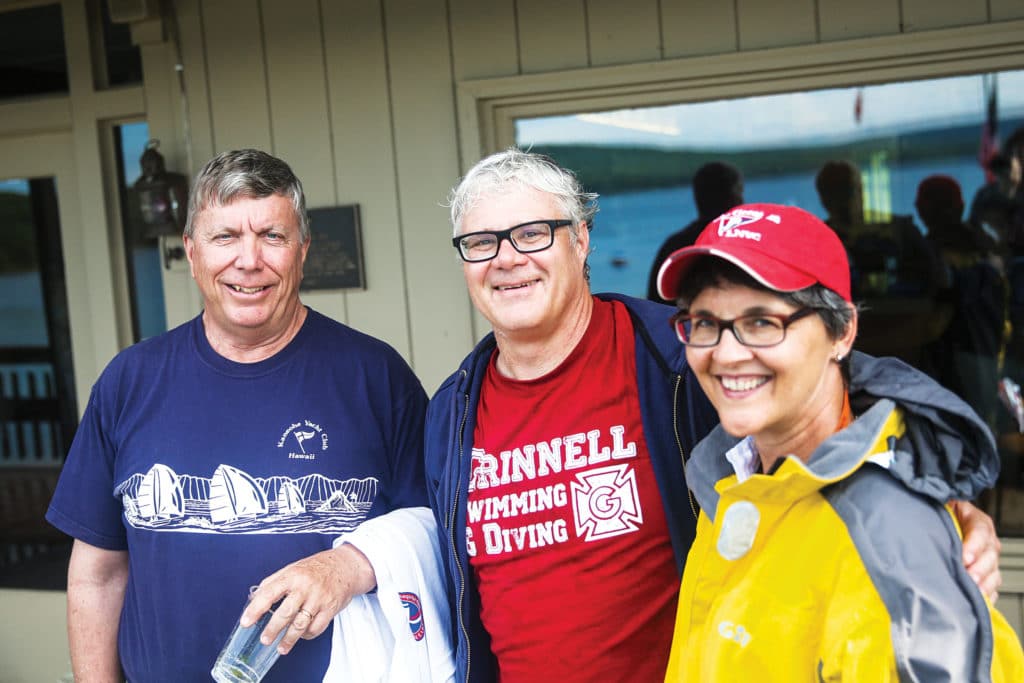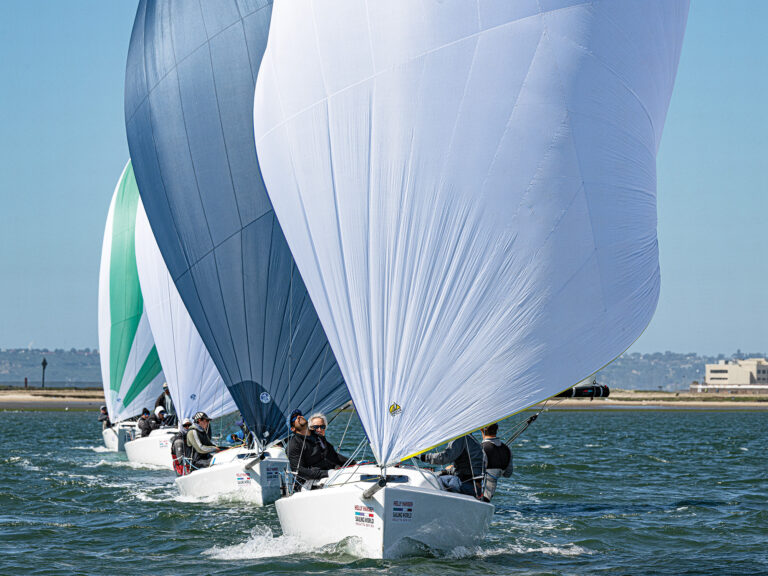We pull into Deep Creek YC at Turkey Neck, Md., in the pouring rain, still recovering from a hair-raising U-turn with our boat trailer on a windy, single-lane country road. We park in the muddy fields of the upper parking lot, and slop to the cedar-sided clubhouse overlooking the lake. With more rain and no wind in the forecast, my mood is glum.
But then I spot my friend, Chris Czapleski, and squeal with pleasure. We embrace like the girlfriends we are, and rejoice in the success of her bunion surgery. Her husband, Tom Hohler, whose foghorn voice belies his amiable nature, stands alongside her beaming, waiting for his turn to share a hug. And so begins the Wife-Husband Flying Scot Regatta, the only spouse-only regatta I know of—no kids, no friends, no girlfriends; it’s married couples only. A ship’s bell soon rings, signaling the start of the grill-your-own dinner. There are two sailing clubs co-hosting the regatta on Deep Creek, a ganglion-shaped lake in the hills of Western Maryland. Friday’s dinner is at Turkey Neck where sailors and old friends greet each other with hugs. There’s little talk of racing, more of pets, mutual friends, black bear sightings, and jokes.
The Wife-Husband Regatta got its start years ago at Cowan Lake, near Columbus, Ohio, home of Flying Scot Fleet No. 1. Sandy Eustis, then of Cowan Lake, was looking for a novel way to boost attendance at the class’s 30th Anniversary Regatta. He thought maybe he could lure more people with the “First-Ever Husband-Wife National Championship.”
Seventy-two boats attended that year and Eustis had a hit on his hands. The regatta’s official name—with wife prominently placed first—is sacred, and Scot sailors fiercely protect it, correcting any newbie who utters husband first.
Let’s face it: Sailing is a men’s sport. Even in dinghy racing, women are scarce, but the Flying Scot is an exception. Many of the top teams today are spouses. Take 2013 North American Champion and 2007 Rolex Yachtsman of the Year, Jeff Linton, who sails with his wife, Amy Smith Linton.
Diane Kampf’s story is like many others at Deep Creek. “The first time I went on a boat, I cried when it tipped,” says Kampf. The next time her husband Greg took her sailing on his Scot, Diane’s 65-year-old mother-in-law came along, too. “She sat there like she was knitting,” says Kampf. “I decided, if she could do it, so could I.”
The Kampf’s first Wife-Husband was in 2000 at Saratoga Lake Sailing Club, N.Y., which traditionally gave out camp chairs as trophies. For the Wife-Husband they had camp love seats. They still have theirs.
“Greg is a gentleman on the boat,” says Kampf, explaining why she likes to sail with him. “He says please and thank you, he taught me everything I know. It’s something we get to do together that we’ll always have.”
When Kate and Roger Sharp were dating, Roger took Kate sailing in the New Year’s Regatta in Manhasset Bay in Long Island, N.Y. They capsized, Kate in her heavy Irish knit sweater and other cold-weather clothes.
“That’s it,” she said, “I’m never sailing again.”
They eventually married and had two children, both of whom sailed with Roger all the time. In 2009, after about 20 years of marriage, and almost as many years as a junior sailing mom, Kate decided she’d give racing another try. The Wife-Husband was at her home club and the regatta offered a non-spinnaker division, so Kate agreed to crew. They won the 13-boat division, and she’s been sailing ever since.
“I liked the strategizing with other boats,” she says. “It puts a whole new spin on sailing. Everyone is literally in the same boat. Not everybody here is the top crew that the skipper can find. Instead, people who live together play together.”
By 9:45 p.m. on the opening evening, after sailors have had their fill of brownie fudge sundaes and beer, the party winds down and the clubhouse is quiet. There’s no bar hopping for this crowd. Gray hairs far outnumber perky butts.
The following morning, the crisp air feels more like April than July. The skippers’ meeting starts late in the morning and is short and sweet. Once it’s over, we mill around, hugging, laughing, greeting old friends, and making new ones. Most of the 42 boats are already in the water.
By the time we leave the dock the air is warm, the sky an electric blue and the predicted rain is nowhere in sight. The clouds are white and puffy, and the north wind is gusty. The starting sequence begins. There’s no more smiling and waving at friends. We’re in race mode. It’s a clean start. We win the pin, and in just a few minutes, we can clear the fleet on port tack. We savor our lead until the second downwind of the five-leg, windward-leeward course, when we see that John and Sharon Wake and John and Lisa Meredith have snuck past. We beat the Wakes to finish second. Then we all head to shore for lunch.
Like many others here, my husband, Ben Williams, taught me everything I know about sailing. When I first started racing with him we had a Lightning, which we sailed together with our then nine-year-old daughter. Very few men at our club raced their Lightnings with their wives, and I often felt self-conscious about being one of the few women, not to mention having a pre-teen on board. I sailed with him, but I wouldn’t say I loved it.
When we moved, our new club didn’t have Lightnings, so Ben looked into the Flying Scot class. He noticed they had a national event specifically for wives and husbands, and that alone convinced me that the class was right for us. We bought a boat in 2006 and we now travel to regattas several times a month during the sailing season.
The second race follows lunch. The wind direction is the same, but the shifts are bigger. The Merediths win this race, too.
On Sunday, the winds are lighter and shiftier. The Merediths have a commanding first-place position with 2 points, and we’re in a three-way tie for second. The start is postponed several times as the wind shifts 90 degrees or more. The gorgeous weather, with no sign of rain, welcomes the lake’s powerboat armada, which turns the lake into a washing machine. The Wakes have a masterful race. We are lost in the back of the fleet. Frustrated I grumble, “look at the wind over there, maybe we should tack.”
“We just need to keep going this way,” Ben insists. Sure enough the wind fills in for us and we catch some boats, finishing sixth—better than I expected.
At the club, while everyone finishes lunch, the results are announced and the winners troop up for their hammered pewter candy dishes. After another round of hugs we hit the road for our 12-hour drive home, tired but jazzed from visiting with and competing against so many friends and great sailors.
“Sorry I grumbled,” I say to Ben as we pull away. “No problem,” he says, as he leans over to kiss me.
Even though the Wife-Husband was one of the main reasons we bought a Flying Scot, it took us several years to get to our first one. Now that we’ve experienced it, we’ll never miss it.
This article first appeared in the July/August 2014 issue of Sailing World.












